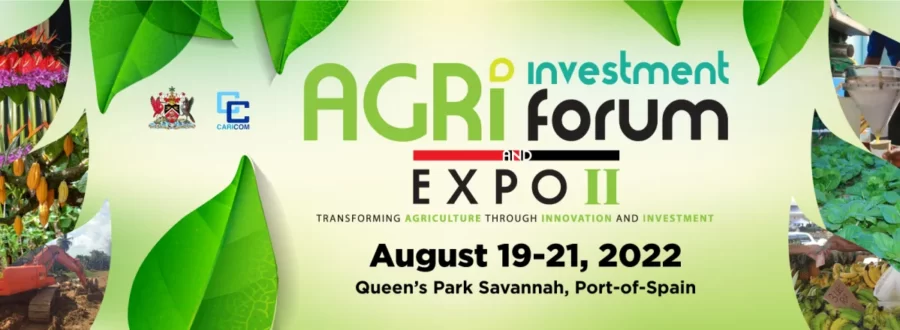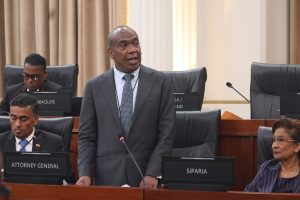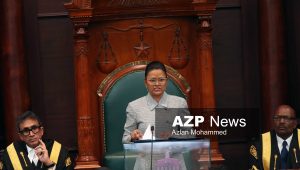‘… I pondered whether the UNC was justified in its criticism, having had the experience of managing the agriculture sector for five years’

THE Caricom Agri Investment Expo, a regional event with extensive participation from our Caribbean counterparts, was held over a three-day period from August 19 to 21, 2022.
Attending it, I was pleasantly surprised at the scope of the event and the potential value and opportunities presented to participants and visitors alike.
However, not everyone saw it in this positive light. The opposition condemned the event, calling it a “pappy show,” implying there was no real value to it. Members protested outside claiming nothing has been done to progress the sector over the years, while purporting to stand up for the rights of farmers.
In light of this seemingly extreme reaction to, what I considered to be a very progressive initiative, I pondered whether the UNC was justified in its criticism, having had the experience of managing the agriculture sector for five years.
With this in mind, I decided to explore and examine UNC’s record in agriculture to see if their criticism is warranted, against a backdrop of performance or simply a matter of “pot calling kettle black.”
During the UNC’s tenure in government from 2010 to 2015, a cumulative sum of $7.5 billion was spent on the agriculture sector. This is a significant injection in the industry, over a five-year period and one would expect to see significant results from this expenditure. But what were the real results and outcomes from this injection?
According to the Central Bank data on the agriculture sector, in real terms, agriculture actually declined between the period 2010 to 2015. Further, there were significant years of decline such as 2012 with a -12.1% contraction and 2013 with a -5.8% contraction in the sector.
With such a large injection over the five-year period, something was definitely wrong with the management of agriculture during the UNC’s tenure, for it to experience a real decline as it did, over the five-year period.
One of the main indicators of a healthy local agriculture sector is its impact on local food prices and food price inflation. With a dedicated ministry of food production, the UNC administration was focused on food production with the aim of lowering prices and reducing the food import bill.
From my examination of the data, they failed on both fronts.
Food price inflation was actually higher in UNC’s tenure than in the first five years of the PNM’s tenure.
During UNC’s tenure, food price inflation reached as high as 19% in 2012 and hovered around 10% per year throughout the entire period. Compare this to a below 5% food price inflation rate during the first five years of the PNM’s tenure from 2015 to 2020.
Reducing the food import bill is a stated objective of all efforts in local agriculture and food production. Reducing our dependence on imported food would save this country vital foreign exchange, protect us from increasing global food prices and expand and sustain our local agriculture industry.
Success of an administration’s agriculture policy is dependent on reducing this bill. Again, given the significant investment in the sector, the UNC administration failed to reduce the food import bill, instead, in the five-year period, this figure actually increased from $3.9 Billion in 2010 to a reported $4.2 Billion in 2015.
Not only do the aggregate statistics indicate a failure of the UNC in the agriculture sector but an examination of their individual policies reveals similar deficiencies. One of the flagship initiatives of the UNC government was a major thrust in local agriculture production called the Caroni Green Initiative.
The stated objective in 2013 was to bring 5,800 acres of former Caroni Ltd lands under cultivation to significantly increase local food production, reduce prices and decrease our food import bill. In a classic example of government mismanagement and waste, by 2015 it was revealed that over $22 million had been spent in this company with little to show for it. An Ernst and Young independent audit report revealed that while millions were spent on salaries for staff and questionable purchases, actual output was minimal.
Farmers only received roughly $76,000 during the period, while piles of harvested crops were left to rot. The colossal failure of this agriculture initiative, riddled with mismanagement, waste and procurement issues had to be eventually closed down.
When I look at the UNC opposition’s criticism of the government’s policies on agriculture, I cannot take it in a vacuum, as context must be added.
They had an entire five-year term to demonstrate what they could have done in the sector. From my analysis, it is clear their efforts failed to expand the industry, did not reduce food prices and the food import bill actually increased. Further, initiatives like Caroni Green, costing millions of taxpayers’ dollars proved to be colossal failures, without contributing to the sector.
Often, the UNC purports to be the defender of farmers while recommending policies. But in light of what I have just presented, the question must be asked, was the UNC’s management of the agriculture sector a “pappy show”?
Vyash Nandlal hold a Bachelor’s degree in Economics and an MSc in International Finance. He has more than 12 years’ experience in the field of economic research and analysis. He currently works as an economic researcher and advisor in the Office of the Prime Minister and sits on the boards of several state and non-profit organisations. The opinions and comments expressed by him are not necessarily those of AZP News, a Division of Complete Image Limited.
![]()














